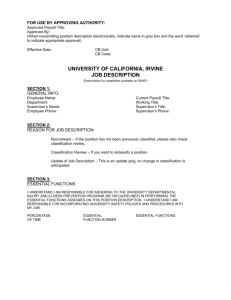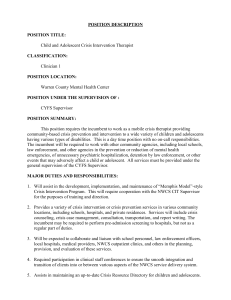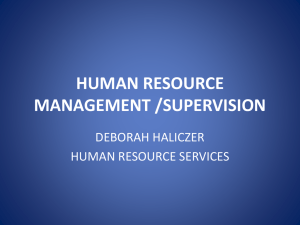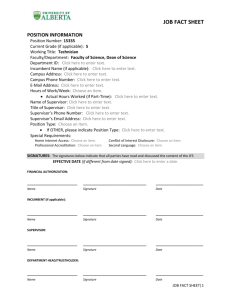POSITION DESCRIPTION FORM
advertisement
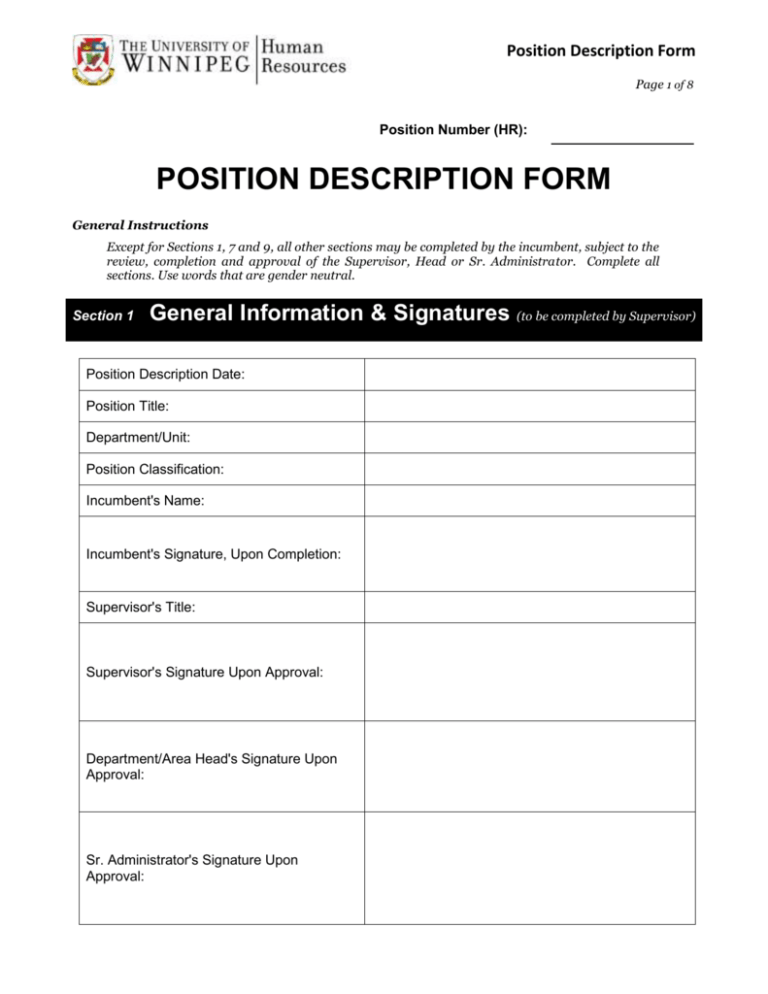
Position Description Form Page 1 of 8 Position Number (HR): POSITION DESCRIPTION FORM General Instructions Except for Sections 1, 7 and 9, all other sections may be completed by the incumbent, subject to the review, completion and approval of the Supervisor, Head or Sr. Administrator. Complete all sections. Use words that are gender neutral. Section 1 General Information & Signatures (to be completed by Supervisor) Position Description Date: Position Title: Department/Unit: Position Classification: Incumbent's Name: Incumbent's Signature, Upon Completion: Supervisor's Title: Supervisor's Signature Upon Approval: Department/Area Head's Signature Upon Approval: Sr. Administrator's Signature Upon Approval: Position Description Form Page 2 of 8 Section 2 1. Department/Area and Position Summary Briefly summarize the purpose, size and scope of the Department or Area in which this position exists. 2. Complete this Organizational Chart of the Department/Area showing positions (and their classification) above, around and reporting to this position. Special reporting relationships (e.g. a dotted line) may be noted under the organizational chart. 3. Now that you have described the Area, in two or three sentences briefly summarize the essential purpose(s) of this position within the context of this area. Position Description Form Page 3 of 8 SECTION 3 Major Areas of Responsibility Prioritize and define this position's major areas of responsibility as headings (eg. Supervision, Planning, Data Entry, Registration, Testing, etc.) Assign an approximate indication of the annual time spent on each one (e.g. as percentages: 10%, 15%, 25%, etc.) Priority Major Areas Of Responsibility Approx. Annual Time (%) 1 2 3 4 5 Section 4 Major Areas of Responsibility & Activities For each major area of responsibility defined in Section 3, describe the essential activities this position must perform to complete it. Use non-technical language and explain processes in their normal sequence. To save space, describe activities in point form using action verbs and statements that describe what is done and how it is done. Responsibility and Related Activities 1. 2. 3. Position Description Form Page 4 of 8 Section 5 Independent Action/Decision Making 1. List the kind(s) of significant action/decisions the incumbent takes/makes independently. 2. List the kind(s) of significant action/decisions the incumbent refers to others. Section 6 Purposes of Contacts In relation to the contacts this position has within The University of Winnipeg and with other contacts, first describe the purposes of the contacts and then indicate the department or title of the contact. 1. U of W Contacts Nature of Contact Interaction With 2. External Contacts Nature of Contact Interaction With Position Description Form Page 5 of 8 Section 7 A. Direction (to be completed by Supervisor) Direction Provided to this Position Select the most appropriate definition of supervision, direction or guidance that this position receives. Add an explanation if necessary. B. [ ] Close Supervision Detailed verbal/written instruction and/or established work routines with close observation maintained over most facets of the work [ ] General Supervision Standard practices and well defined guidelines which are followed with occasional referral to the supervisor [ ] Direction Considerable independence in choosing methods used to maintain departmental objectives and/or complete well-defined projects with consultation where a lack of precedent occurs [ ] General Direction Significant independence in establishing practices and procedures and maintaining objectives for an area within general policies [ ] Administrative Guidance Guidance received only in coordinating work groups within divisional and University policies and goals Direction Provided by this Position Indicate the number of positions supervised or directed by this position (including those reporting directly to you or through other supervisors). Where there are none, enter a zero below. After each area of direction listed, explain the kind of supervision or direction this position provides (eg. participates in, recommends, makes decisions, carries out, delegates, etc.). Number of Positions Supervised (if fully staffed): ________ Full & PT Permanent Continuing Areas of Direction _______ Temporary/Consultants Kind of Supervision or Direction This Position Provides 1. Hiring 2. Orientation of new staff 3. On-the-job training Position Description Form Page 6 of 8 Areas of Direction Kind of Supervision or Direction This Position Provides 4. Work assignment and distribution 5. Performance Review 6. Motivation 7. Discipline/dismissal 8. Other Section 8 Working Conditions For each of the four working conditions listed, select only one definition for each condition which best fits this position. 1. Physical Effort (eg. lifting, pushing, pulling, carrying, stretching, etc.) [ ] A. Light physical effort on a regular basis, normal physical movement in comfortable physical positions (eg. normal office work). [ ] B. Moderate physical effort on a regular basis, constant standing/walking or sitting in a fixed location, in some awkward positions (eg. trades, waiter). [ ] C. Heavy physical effort on a regular basis, varied activities in awkward/confined spaces (eg. firefighter, furniture mover). [ ] D. Strenuous physical effort on a regular basis, varied activities at the same time in difficult positions and confined spaces (eg. bricklayer's helper). Example(s) if more than A: 2. Physical Environment (eg. noise, dust, dirt, fumes, vibration, hazards, etc.) [ ] A. Limited exposure to one or more conditions, resulting in mild discomfort, with a remote possibility of accident or ill health (eg. normal office environment). [ ]B Exposure to various conditions, resulting in considerable discomfort, with a moderate possibility of accident or ill health (eg. trades). [ ]C Considerable exposure to various conditions, resulting in extreme discomfort, with a substantial possibility of accident or ill health (eg. millwright, laundry worker). [ ]D Exposure to hazards, resulting in extreme discomfort, with an extreme possibility of Position Description Form Page 7 of 8 accident or ill health (eg. police officer, firefighter). Example(s) if more than A: 3. Sensory Attention (eg. hearing, seeing, smelling, touching, etc.) [ ] A. Limited sensory attention, using usually one sense at a time, under normal use (eg. normal seeing and hearing). [ ] B. Moderate sensory attention, using two or more senses at a time, under frequent use (eg. truck driver, drafter, police officer) [ ] C. Considerable sensory attention, using two or more senses at a time, under constant use and coordination (eg. lab. technician, nurse, food or beverage taster). [ ] D. Extreme sensory attention, using two or more senses at a time, under constant use and co-ordination, requiring reaction (eg. micro-assembler, orchestra musician). Example(s) if more than A: 4. Mental Stress (eg. unpredictability or irregularity of work, disruption, deadline pressure, anxiety, tension, etc.) [ ] A. Limited mental stress, in normal situations with limited pressure where the seriousness of outcomes is limited. [ ] B. Moderate mental stress, in unpleasant situations with occasional pressure where the seriousness of outcomes is considerable (eg. serving public). [ ] C. Considerable mental stress in disturbing situations with noticeable pressure where the seriousness of outcomes is substantial (eg. flight attendants, firefighters). [ ] D. Extreme mental stress, in stressful situations with noticeable pressure where the seriousness of outcomes is extreme (eg. air traffic controller, police officer) Example(s) if more than A: Position Description Form Page 8 of 8 Section 9 Minimum Qualifications Required List the minimum qualifications a new employee would require in order to fill this position as now described. All qualifications listed should be bona-fide and relate directly to Section 4. Major Areas of Responsibility and Activities. Qualifications may be listed as assets or preferred if they are not essential minimum qualifications to start this job. A. Formal Education and Designations (level and nature): B. Experience (amount and nature): C. Skills, Knowledge, Abilities including software, computer systems, specialized, technical instrument/machine operation, office/management, etc. (level and nature): OR EQUIVALENT COMBINATION OF EDUCATION, EXPERIENCE, SKILLS, KNOWLEDGE AND ABILITIES



